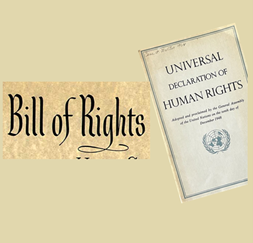Politicians and voters throw the word “right” around far too easily. The American Founders had a precise understanding of rights when they created the “Bill of Rights” as the first ten amendments to the Constitution.
A “right” was a restriction or legal procedure imposed on the government to protect the life and property of a citizen. It was a constraint on the government. If it must act, it had to follow a prescribed procedure to ensure that the citizen was being treated fairly in a legal process.
When the United Nations was being created, Eleanor Roosevelt was part of a group that developed the Universal Declaration of Human Rights. This declaration included the kind of legal rights in the American Bill of Rights but went much further.
It contains thirty articles, five of which are requirements for services.
· Article 22 refers to social security ... “for his dignity and the development of his personality”.
· Article 23 is about employment and sounds like labor leaders wrote it. The phrase “equal pay for equal work” has often been quoted.
· Article 24 specifies” the right to rest and leisure, including reasonable limitation of working hours and periodic holidays with pay.”
· Article 25 has two parts. The first sentence specifies “a standard of living adequate for the health and well-being of himself and of his family.” We’ll come back to this. It is a “kitchen sink” of items. The second section refers to motherhood and children, regardless of their “legitimacy.”
· Article 26 calls for free and compulsory elementary education.
For those of us in modern America, Article 22 seems reasonable, but in the early twentieth century, this was unheard of. No one assumed life promised any security. That the government would arrange to take money, even in the form of insurance, to guarantee a secure income at any point in one's life was unthinkable. That someone else’s money would go to your benefit was absurd.
Articles 23 and 24 refer to working conditions, working hours, and compensation. These are suitable items for negotiation, but not rights. The employer bears the costs of these benefits. Economist Thomas Sowell has noted that governments are free to set any employment costs and benefits they choose, but the actual minimum wage is zero. If the legal burdens are too high, no companies are started, and no employees are hired.
We’ll come back to Article 25.
Article 26 addresses education. This is personal, because my father had to leave school at age eleven when his father died. Protestant America was concerned that children learn to read since every Christian had to be able to read the bible. Schools for all were common. You had to be free to attend. If you were working to earn money for the family, that was unfortunate.
There are three arguments for supporting mandatory education for every child.
· Find and promote the best skills of all the people in society. This is a wartime or “Space Race approach.” When there is a need for talent, we look everywhere.
· Find talent to avoid a locked-in caste system. Allow new talent to rise.
· Since there is a rising cluster of older people, we need trained people to care for them.
Interestingly, the third paragraph of Article 26 says,” parents have a prior right to choose the kind of education that shall be given to their children. That is contrary to German law and would seem to require school choice.
The first paragraph of Article 25 is unbelievably expansive and sounds like the chart for a United States Department of Benevolence:
Everyone has the right to a standard of living adequate for the health and well-being of himself and of his family, including food, clothing, housing and medical care and necessary social services, and the right to security in the event of unemployment, sickness, disability, widowhood, old age or other lack of livelihood in circumstances beyond his control.
All these things are wonderful, but they don’t just happen. Someone must provide the materials and services. It is one thing for the government to take taxes for everyday government tasks. Providing all these services requires far greater resources.
Let’s be clear. Charity is a voluntary act. A government official never practices charity. When I pay taxes, I am not charitable. Taxes are extracted through the threat of force. They are the equivalent of a thief taking my money and giving it to someone else.
If I give money, I control each payment. I can stop giving if the recipient is no longer worthy or needful. I provide money to people who are careful with donations. Government agencies and services don’t meet either of these requirements. Rules and procedures dominate.
Canada, the United States, and the European countries committed themselves to this list of programs and are now in financial difficulties. They tried to give away something they didn’t have. The cost of everything on the list has risen faster than inflation. Education, housing, medical care, retirement payments, and disability care are all stretching government and personal budgets.
They have all become examples of utopian wishes meeting reality. It would be nice if everyone could have all these things. The real world is about making trade-offs and dealing with scarcity. When politicians and governments ignore this fact, the piper stands by, waiting to be paid.

